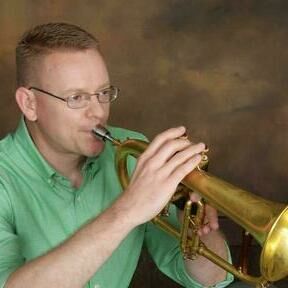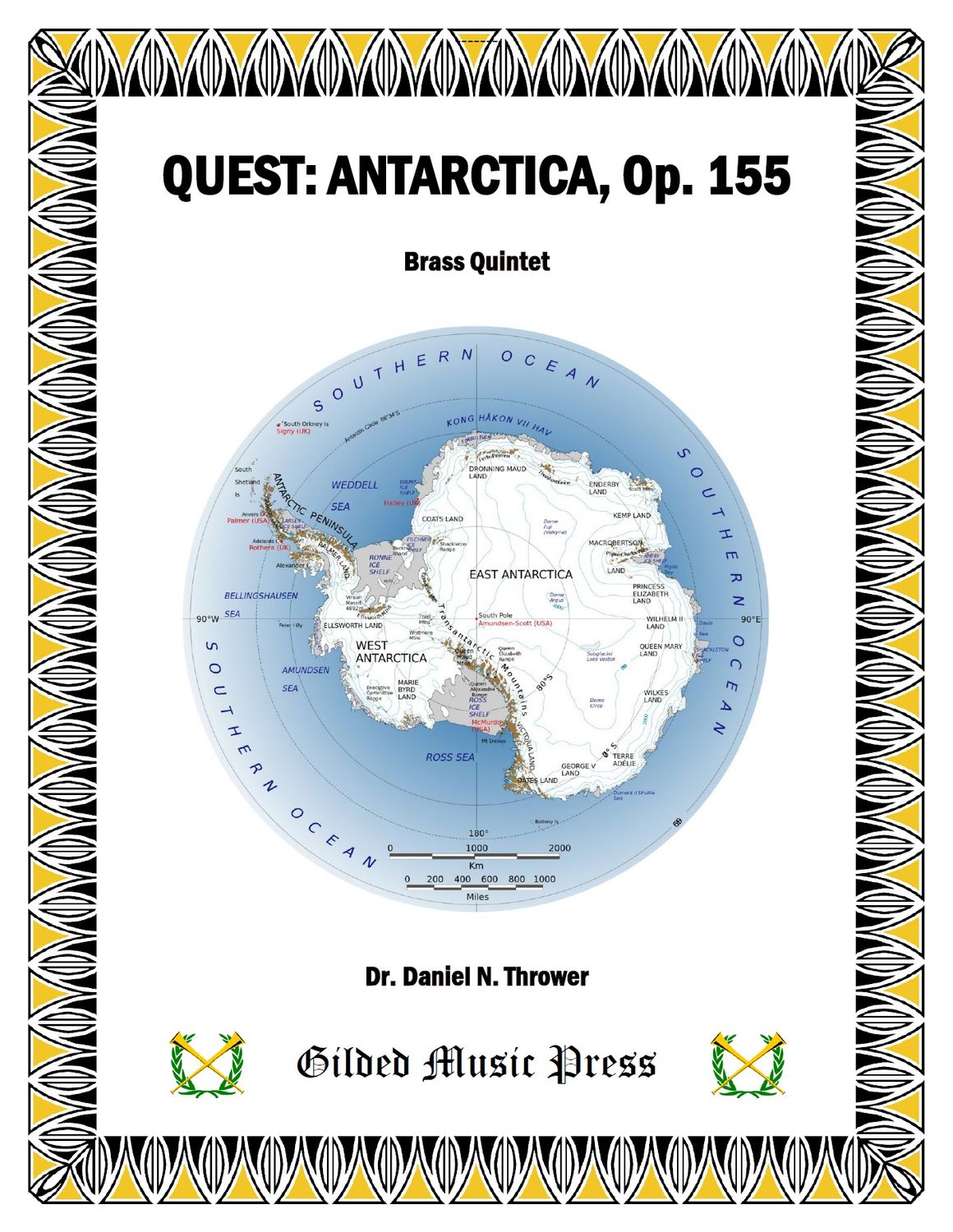
GMP 3069: Quest for Antarctica, Op. 155 (Brass Quintet), Dr. Daniel Thrower
Antarctica has always been an intriguing, mysterious mass of foreboding cold and myth. There is hearsay that the landmass was once tropical, densely forested, boasting a great variety of animal life, hinting toward ancient habitation by earlier humans—perhaps very advanced humans. For practical purposes, however, what modern man knows about the region, by and large, is that it is earth’s southernmost frigid extremity, barren, expansive, and hostile to most life.
It is estimated that approximately a quarter of a million people have ever set foot on the vast frozen desert. In terms of current global population alone, that represents only three ten-thousandths of a percent (.0003%) who have been there. In terms of the total population of recorded history, the percentage shrinks to a speck above nil, appealing to a strange populace that seeks out bizarrely worthy exclusivity. The beaches are not inviting; luxury is nonexistent; amenities are sparse; danger threatens vitality on every square inch. There is little there that invites humanity’s presence. Really, who would want to be among that infinitesimal number of extreme travelers?Me!But why?
Sparse scholastic units and even sparser maps of the frozen wasteland sprinkled my childhood. When it snowed in my hometown, my mind trekked to a polar region for a grand expedition. What adventures I imagined! It wasn’t until middle-age that I found myself in a position to potentially visit Antarctica! In 2023, my military service took me to Japan for three years, traveling through an area of responsibility that included 36 countries, the two non-continental States of America, and… yes, Antarctica! Shortly upon arrival to Japan I started researching stations and the continent’s history, setting sights on McMurdo Station as my quest, with a lofty side-goal of the Amundsen-Scott Station at the South Pole, latitude: -90°.
Days before the 2023 deadline, I discovered “Polar STEAM”, a program enabling Antarctic residencies for artists and writers, including musicians. As music was disproportionately underrepresented in the history of this exciting program, I ventured an attempt to create a worthy, albeit hasty, application package. Unfortunately, though not surprisingly, I was not selected to be one of the participants for the 2024-25 artist residency, but the planted seed germinated my aspirations for forthcoming application cycles!Undeterred, my dreams expanded far beyond the plan outlined on my initial submission. The 2024 application was to include this preemptive composition, Quest: Antarctica, as the first of an entire brass quintet album depicting scenes and experiences from a several-week residency at the expansive southern polar cap.
During Quest’s compositional process, I received the crushing news that applications would not be accepted in 2024 for 2025-26 summer residencies in Antarctica. With increasingly fervent resolve, I pressed on to complete this composition (which was completed on 26 May 2024), patiently anxious for a future opportunity, even more strongly motivated to work on an iron-clad presentation for 2025, or beyond, if necessary.
This passionate composition, Quest: Antarctica, strays from my established styles of writing, while retaining my favorite medium of brass quintet. With profound symbolism of aspects of my ambitious quest throughout the piece, this work truly is a personal musical journal entry—a vehement expression of one of my life’s deepening desires. With no indigenous population on the empty continent, a legacy of arts and music lies in the creative hands of current and future artists of all disciplines who share a passionate curiosity to connect with that icy land and leave a mark through profoundest artistic expression. That potential legacy lays the foundation for my Antarctic Quest!
ABOUT THE MUSIC
I rarely write extended passages for the tuba’s extreme low range, but the ominousness of my quest demands this opening gravitas. A hauntingly simple theme arises in the trombone, also in its low register, underscored by the low tuba’s weighty sonorities and emphatically punctuated in the horn. Harmonic structures remain open with a sparse, albeit sophisticatedly complex texture. The repetition of the opening theme becomes more focused and melodic, doubled in octaves with increasingly intense dynamics, with eventual inclusion of mid-low-ranged trumpet. With some exceptions, intervals remain open or dissonant, establishing a sense of mystery and portent. The theme’s third iteration begins with increased rhythmic interest and inverted intervallic direction as focus refines to the extreme south. This third thematic restatement terminates with intensely strident harmonic clusters that elide into accompanimentally driving rhythms over a fourth thematic statement obscured by variation so extreme that it could be deemed a secondary related theme. This soon distills back to the original theme, now lacking the foundational tuba, intentionally symbolizing the lack of terra firma under the feet of Antarctic travelers who find their tracks at times distanced from rocky terrain by up to three miles of ice. The repeated cadential ending of this iteration consists of open fifths and octaves, scored in such a way to produce a ghostly acoustic interference pattern of the absent major third. Prior to this acoustic illusion, only two other major triads are written, both at similar cadential endings of thematic statements. This one, however, alludes to a missing element that should be present, suggesting that the composer needs to set foot on the continent to begin fulfillment of the grand quest. Also significant, this cadence occurs as a third ending to this phrase, which terminal repetition foreshadows the composition’s end. Brief silence at this point in the composition could be an ending point for the work. With “POLAR Steam” rejecting my initial application in 2023, that could have marked the end of my aspirations. With emphatic and exclamatory defiance of the rejection, the theme blows up with explosive dynamics. Presented now in parallel fifths in the trumpets, this openness is underscored by soundly established foundational rhythms in the bass anchor note. The anchor transitions into exquisite symbiotic counter-lines in the other accompanying instruments to paint an aural depiction of my desires to work with scientists, geologists, climatologists, and others already in force on the continent. This climax presents itself superbly at the golden mean of the work, nature’s most aesthetically pleasing ratio. The rhythmic complexity that ends this bursting theme boils back down to a cadence with open fifths, again scored to sonically fabricate the missing chordal major third: a recurring symbol of the composer, heretofore missing from the Antarctic experience. This cadence repeats for a total of four times in this instance, eliding with a rhythmically clear indication in the first trumpet (also a symbol of the composer, who plays this part in all his compositions) that the piece’s end is not yet. Still fighting for inclusion, the quest continues. Now treading lightly over the persistent bass anchor, surprising chords stray from expectations, rising to cinematic drama, and falling again to a familiarly calm, though agitated, presentation of the thematic content in the low brass, as in the beginning. The second half of this final iteration, however, bursts forth once again, perhaps the most passionately of the work, with a grating obbligato in the horn and painfully strident harmonies—the most agonizing longings to become a part of something enormous, meaningful, exclusive, historic, significant, irrevocable, and defining: a resident artist of Antarctica, contributing to the wanting cultural legacy of the uninhabited continent. The faux endings in previous cadences return nine-fold to terminate the piece, not necessarily as pleadings for acceptance, but rather statements of intention for unending attempts to one day succeed in becoming part of Antarctica’s artistic legacy.
Why Choose Us?
Gilded Music Press specializes in brass music and pedagogical materials composed and crafted by Dr. Daniel Thrower. His expertise and experience in the music world are now available in printed or PDF format for the music world's benefit.
For questions, specific requests, or to commission a new work from Dr. Thrower, please contact us via email or phone, below.
"You and your compositions deserve first rate ensembles, they’re that good! It’s an honor to know you and, from time to time, celebrate your wonderful accomplishments."

About Us

Dr. Daniel N. Thrower
Owner
"Gilded Music Press" was created specifically to make Dr. Daniel Thrower's high-quality music available. Dr. Thrower has been composing music and writing educational supplements for decades. He describes his music as a "personal musical journal". From his work with military ensembles to faculty and students of all ages, his music and teaching materials are created to edify audiences, professional colleagues, students, and himself. Through "Gilded Music Press" the global music community benefits from his excellent research, experience, and creative output. Many have enjoyed and benefited from his work throughout the world, and you will too once you discover his phenomenal products!
